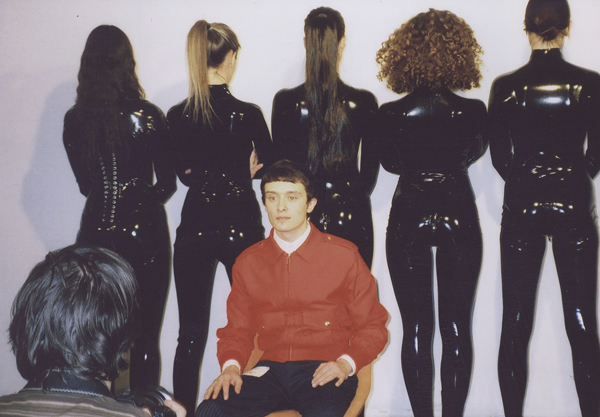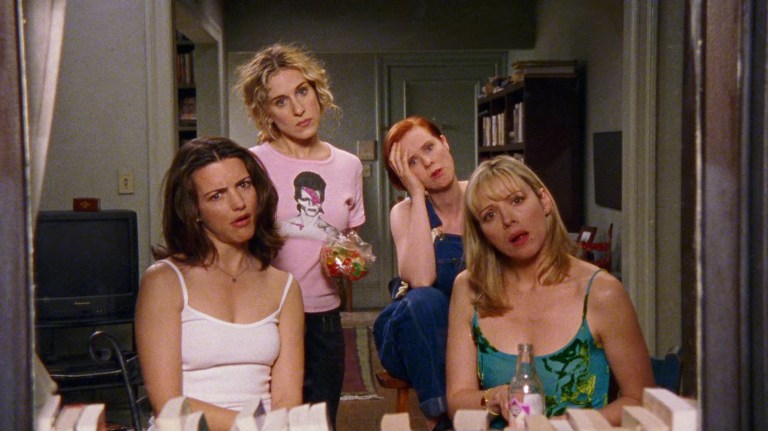
Newsflash: Those That Enjoy Casual Sex, Get More Pleasure From Casual Sex

Stop the Press! This just in! Stupendous! Momentous! Audacious! Earth-shaking! Mind-fucking! Groin-grabbing!
Time magazine—your go-to source for no-shit opinions—reported recently on a study conducted by researchers from New York University and Cornell examining the effects on personal well-being of indiscriminately-sticking-your-dick-in-whoever-is-drunk-enough-to not-care-how-small-it-is—or whatever you’re into. In this taboo-breaking new study, Who Benefits From Casual Sex?, Zhana Vrangalova of NYU conducted research for her doctoral dissertation on whether casual sex can contribute to our overall mental health. And as Samantha Grossman reveals in her hard-hitting Time exposé, it “turns out that no-strings-attached sexy times are good for you, so don’t let the haters stop you from doin’ your thang.”
Apparently, causal sex has become a pretty big deal with the college kids these days, with up to 80% engaging in it. But, as this new study claims, “although sexual activity is linked to many psychological and physical health benefits, these are rarely attributed to casual sex. Instead, scholars and nonscholars have warned against negative well-being consequences of uncommitted sex.” Yet when you ask the 80% of college students who are DTF, more report having positive experiences than negative ones. The researchers believe this discrepancy suggests that we need to broaden the scope of “normative” behavior beyond what has traditionally been considered “universally healthy and socially desirable.” Perhaps, they hypothesized, one’s experience of the effects of casual sex are based more on an individual’s personality than on our overall nature.
To investigate this, the researchers focused on, what scientists call, Sociosexuality: “the relatively stable tendency toward or away from casual sex, determined by a combination of heritable factors, sociocultural learning, and past experiences.” Or in other words, to test whether people who say they like having indiscriminate sex feel better about themselves after occasionally having their clit licked by the pretty blue-eyed half-wit living down the hall—which apparently required an entire year of study and three separate grants (that didn’t go to helping cure cancer or AIDS) to “prove.” But thank Jebus they did. As Grossman so eloquently reported, we are now free!: “If you want to have casual sex, you definitely should. If you do not want to have casual sex, you shouldn’t. The main takeaway of this study? You do you.”
Thanks so much, Samantha, for your blessing. But if only it were that simple…

A long time ago, like almost 100 years, this old, dead, white guy named Sigmund Freud wrote this essay, Civilization and Its Discontents. He was one of the first scientists to do research into the nature of human sexuality, exploring, what he saw as, the problems caused by repressing our unconscious “natural” instincts in a complex, artificial society. In this highly controversial study written during the build up to WWII, he claimed that, while it may be extremely difficult to control our sexual and aggressive instincts, it is also extremely necessary—at least if we hope to continue having such an awesomely advanced society. Although ultimately skeptical about the value of the advances this civilization has achieved, he, nevertheless, believed that the two—repression and civilization—were inextricable.
Thirty-ish years later, the Hippies appropriated Freud’s work to claim that we should start a revolution to destroy both the agents of sexual repression, as well as the confines of, the now even further advanced, technological society. They advocated “Free Love” through a return to Nature because the discontents were becoming far too unbearable. Their sexual revolution would also be accompanied by a social/political revolution, after which we could finally live authentically: true to ourselves and true to Nature.
But, to make a long story short, this revolution failed/was co-opted and “civilization” marches on.

Today, instead, we are constantly being told that that we can have it all, without risk or trade-off: We can be free and enjoy all the goodies civilization has created. All we have to do is just stop worrying about civilization and concentrate solely on ourselves and our individual needs and desires—then everything will be a-okay.
Which just so happens to be exactly what this recent NYU/Cornell study about the benefits of casual sex tells us, too—how… convenient. It concludes that if one simply acts “authentically” in accordance with his or her individualized feelings—rather than how “scholars and nonscholars” or the wisest humans from throughout the ages who spent lifetimes contemplating the nature of reality tell us—then you can achieve higher levels of self-esteem and life satisfaction, plus lower levels of anxiety and depression. Sounds like a pretty sweet deal to me.
However, not only would I contend that these findings are not true, they also result in two highly pernicious and anti-scientific results: 1) People are further encouraged to not think about their motivation for wanting sex, undermining the human imperative to know thyself; and 2) They give fodder to the unscientific to make political/cultural value claims based on “science” that are unsupported by actual data—Turns out that no-strings-attached sexy times are good for you.
First off, how can you even calculate authenticity? It is one of the most illusive value judgments we humans attempt to make—and one entirely out of the realm of scientific inquiry, I may add. Yet, the study claims that acting authentically in regard to one’s values and desires has been “documented through extensive research as promoting health and thriving; acting unauthentically, on the other hand, is detrimental to well-being.” Oh really? Extensive research you say? Well, in that case.
But also, the character trait Sociosexuality—the thing to which they are attempting to measure the participants’ authentic adherence—is said to be determined by a combination of three completely disparate and conflicting variables:
- Heritable factors: Nature/genes
- Sociocultural learning: education/entertainment
- Past experiences: how one has been treated/mistreated by others
Yet the researchers never reveal how these different elements interact with one another to create the so-called “stable personality” they wish to study. Are we being more authentic when we act according to Nature, nurture or our own judgment—or perhaps some unquantifiable fusion of the three? It’s funny how they neglect to define that, you know, seeing as how the entire study rests upon it.

However, the most damning thing about this experiment is that their entire data set results from self-reporting: In a weekly survey the participants were “asked to think of their most memorable sexual encounter that week and report how much they experienced ‘feeling genuine/true to myself’ and ‘being in control of what was happening’ during this encounter on a scale of 1 (not at all) to 7 (a great deal).”
A little Psych 101 for you: psychology/psychiatry is built entirely on the idea that someone’s surface response is irrelevant because what they truly believe lies in some dark inner recess, inaccessible to them—unless you want to pay $300 an hour for a psychiatrist to help you retrieve it, of course.
But maybe you don’t entirely buy that premise (I don’t)—how about this one? In America today, we are fed so many conflicting messages about sex and relationships that it is practically impossible to know what one wants out of it without deep reflection and self-knowledge—which I’m assuming the college freshmen they recruited for this study probably have not achieved yet. So basing all your data on whether or not a bunch of drunken teenagers can accurately evaluate one of the most difficult Human value judgments is naive at best—and nonsense at worst. (For a exploration of this problem, check out my article on the “Friend-Zone/Girl-Friend Zone”).
Sure, the lack of any thoroughly “scientific” basis for this study conducted by two of America’s top universities—NYU and Cornell—is surely concerning, as well as the blind-trumpeting of its “conclusions” by our click-obsessed media—OMG! A study parroting exactly what our consumers want to hear. It must be my birthday. But what concerns me most here is the motivation of these researchers for exploring this topic in the first place.
Science is built on the idea that we can “prove” hypotheses as being objectively true by disinterestedly adhering to the Scientific Method—as Dr. deGrasse is so fond of reminding us. While I don’t disparage this possibility, we must also realize that the object one chooses to study can never be quite as disinterested. And if the use this study has already been put to by Time and others is any indication, I think it is pretty clear why they chose it—to attempt to normalize casual sex and remove the stigma that it may be “harm-inducing.” But also to try and further discredit the idea that anything can be true about humans, as such.

Unlike Freud and his salacious followers, these researchers seem to want to banish the very idea that any attitude or orientation in regard to sex can be considered “universally healthy and socially desirable.” By disparaging their predecessors—the benighted “scholars and nonscholars” of old—and focusing on Sociosexuality—the individual difference in the willingness to engage in sex outside of a committed relationship—they turn one’s judgment of sex into a mere personal preference. Whether one chooses to engage in sex or not becomes completely inconsequential: It’s just sex—what’s the big deal?
And sure that is certainly one conclusion you could draw from this study —and one you definitely will if you happen to write for Time magazine. But a more interesting result would be to wonder: How do some individuals become sociosexually “restricted” and others “unrestricted,” and what is the significance of these opposing orientations? The researchers have already shown that they’re completely uninterested in parsing the how—heritable factors, sociocultural learning and past experiences—despite their study of authenticity being completely built off it. But what is their stance on the two orientations? They seem to be saying, If you just so happen to be sociosexually unrestricted through some sort of alchemical mystery—GO GET YOUR FUCK ON!
Yes, I know, science is supposed to be “value-free.” But what are the consequences of giving encouragement to the unrestricted?
Well, according to my second favorite source of opinions and ideas, those who are more sociosexually unrestricted tend to be more open to new experiences and extroverted. Cool, I like those kind of people, they’re fun. They also, however, tend to be less agreeable, lower on honesty-humility, more impulsive, more likely to take risks and more likely to have an avoidant attachment style. Hmm, that is a little more problematic… Oh yeah, and they tend to score high on the “Dark Triad” traits: Narcissism, Machiavellianism and Psychopathy. Yikes! (And oh, BTW, have a greater rape myth acceptance, past sexual aggression and conservative attitudes about women.)
But, you know, whatevs. I guess… If you’re happy being an authentic individual, while making everyone else around you miserable—who am I to judge?
So to answer Ms. Vrangalova’s question, Who Benefits From Casual Sex? I don’t know—but it certainly doesn’t seem to be civilization.
But, fuck it, what’s civilization ever done for me? ![]()










